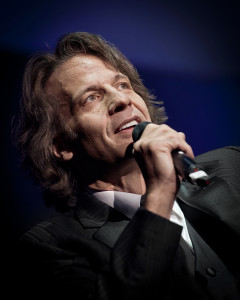 For more than a three decades, Kurt Bestor’s film scores, television themes, compositions and carols have provided an indelible soundtrack of American life. Indeed, much of Bestor’s own life has been dedicated to creating musical parallels to visual images.
For more than a three decades, Kurt Bestor’s film scores, television themes, compositions and carols have provided an indelible soundtrack of American life. Indeed, much of Bestor’s own life has been dedicated to creating musical parallels to visual images.
Perhaps best known for his innovative interpretation of seasonal carols found in his popular 5-CD boxed set “The Complete Kurt Bestor Christmas,” the Utah based composer and
performer launched his career writing music for television and movies. His credits
include more than 40 film scores and more than 40 themes for national TV
programs and commercials. It is Bestor’s music that has introduced NFL Monday Night Football, and National Geographic Explorer; he scored TBS’s Wild! Life Adventures and the IMAX film “The Great American West.”He also was given the Outstanding Film Score Award at the New York Film and Television Festival for his music for PBS’s “A More Perfect Union.” Bestor was awarded an Emmy® for his collaboration with Sam Cardon on the original music for ABC’s coverage of the 1988 Winter Olympics.
Born in Waukesha, Wisconsin, Bestor benefited from his families musical
inclinations. His grandfather played trumpet in many popular mid-western big bands and a
great uncle played trombone in Jack Benny’s band. When he took up piano as a
child, Bestor was encouraged by his mother to improvise with his imagination.
“I’d get restless practicing and my mom would sit down at the piano with me and
say ‘Play something that sounds like a sunrise.'” Thus was born his fascination
with the relationship between music and visual imagery. As Bestor took up
trumpet in his early teens, he set his sights on composing for film. “I knew that’s
what I wanted to do when I saw “Jaws” during high school. I have made a goal to
score films ever since.”
While enrolled in college, Bestor began writing music for student films, gradually
moving onto documentaries and eventually into the feature film score arena. In
1987, he was one of only six recipients of a fellowship at the Sundance Film
Institutes Film Composer Lab. There, he studied with master film composers
Dave Grusin, Alan Silvestri and David Raksin.
Even while Bestor’s scoring career flourished, leading to such projects as music
for the National Geographic documentary on the sinking of the Andrea Doria, a
second large screen film “Sedona,” the feature film “The Ghosts of Dicken’s
Past,” and the Warner Brothers film “Scarecrow,” he expanded his career to
include original recordings and increasingly popular concerts.
In 1988, he recorded his first best-selling Christmas album. “At the some time, everybody I
talked to said it was a bad idea,” he recalls. “There was only one other album out
there of contemporary instrumental Christmas music, by Mannheim Steamroller,
and I was told that the three-month period from October though Christmas was
too short to market a new record.” But after staging a sold-out, 2,500 seat
concert to support the album, Bestor found himself at the helm of a holiday
tradition, inspiring further recordings and annual concerts across the country.
He often spends an average of one week out of every month performing, with a full
time concert schedule during the Christmas season. Featuring as many as 45
other musicians on stage, Bestor’s concerts are major productions, but his warm
storytelling and humor create an intimate rapport with his audience. “It’s a bit like
Garrison Keillor-meets-John Williams,” he laughs. The year 2008 marks Bestor’s
20th year of sold-out Christmas shows.
In spring of 2000, Bestor’s easy-going manner and rapport with audiences were
showcased in the PBS concert filming of his “Innovators” album, with Sam
Cardon. The nationwide special was so successful that a follow-up “Innovators II:
Keepers of the Flame” was produced for release in conjunction with the 2002
Olympic celebrations.
In August 2001, Bestor’s composing and conducting talents were highlighted
when his powerful “Saints on the Seas” oratorio was performed in major
European cities against the backdrop of some of the worlds most beautiful
concert halls.
In 2002, Bestor had the distinctive opportunity to conduct his music (co-written
with fellow collaborator Sam Cardon) during the Closing Ceremonies of the 2002
Winter Olympics in Salt Lake City. He was also honored to have carried the
Olympic torch through Salt Lake City. “It was truly a gold-medal experience. Rubbing shoulders with incredible athletes and being joined on stage by Josh Groban, Charlotte Church, Earth Wind and Fire, Moby, KISS, among others was unforgettable.”
Several years ago Kurt premiered his “Night at the Movies” concert with the Utah
Symphony – a journey through the last 85 years of movie music. Using a giant
screen, guest vocalists, and his usual concert repartee with the audience, Bestor
traced the art of film scoring from its silent piano roots to today’s exciting scores.
This entertaining presentation played to three sold out shows and was introduced in January 2005 to English audiences when he performed with the Royal Liverpool Philharmonic.
Never one to sit still, Bestor, in 2006, added radio to his long list of accomplishments when he agreed to host a morning talk show on a brand new station for women in Salt Lake City AM820. His show “Wakin’ Up with Rebecca and Kurt was popular with Wasatch Front listeners from Provo to Logan.
His most recent project was a classical commission by the Mormon Tabernacle Choir and Orchestra – a piece written for choir, orchestra, children’s choirs, and 500 bell ringers commemorating the rededication of the Utah State Capitol.
Bestor, his wife Petrina make their home at the foot of the mountains in Salt Lake City.


